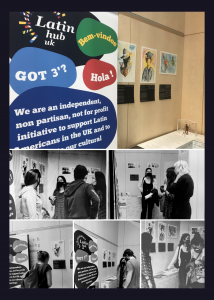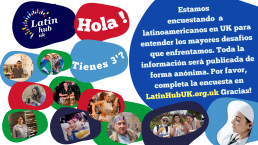Get paid to get into teaching!
Different Routes For Infant, Primary, Secondary and Higher Education in the UK
 Hello everyone! My name is Marina and I wanted to share with you my ‘mini-research’ on how you can get the necessary qualifications to be able to work in the UK as a teacher.
Hello everyone! My name is Marina and I wanted to share with you my ‘mini-research’ on how you can get the necessary qualifications to be able to work in the UK as a teacher.
My academic background is in design and environment and, although I am still involved in projects and initiatives in this area, I decided to explore a career in education because of the job stability it represents and, let’s not deny it, the generous holidays it offers as well 🙂
If you are not 100% sure if this is the right job for you, you can apply for jobs as teaching assistant, you do not need teaching qualifications and you can get a felling of what being a teacher is. Also it is a good way of practising English!
Teaching salaries vary according to experience. You can also watch this video below to get a felling what being a teacher really is:
One of the main barriers to working in this profession is the qualifications required. Below is a summary of what I have researched and I am happy to answer any questions or comments you may have.
To become a qualified teacher in state schools across the UK you must undertake Initial Teacher Training (ITT) or Initial Teacher Education (ITE).
Entry is generally competitive, but much less so for subjects such as science, maths, physics and languages such as French or Spanish! Because they are in high demand the Government provides grants and bursaries to help with the cost of training.
Yes, that’s right!
Completion of ITT leads to Qualified Teacher Status (QTS) in England and Wales and Teaching Qualification (TQ) in Scotland. Completion of ITE may not automatically lead to a QTS, so it is very important that you check the additional steps required to get QTS status when you finish your education.
There are so many training courses and programmes into teaching that it can get overwhelming. The following video explains them briefly and we will explain the most popular ones below (adding external links for further information). *Remember that on the top right of this page there is an automatic translator so you can read this information in Spanish if you need to.
Early Years Initial Teacher Training (EYITT)
There are an undergraduate and postgraduate routes for those interested in early years education. On completion of training for early years education, Early Years Teacher Status (EYTS) is acquired, which is equivalent to QTS, but only for working with children aged 0-5 years.
Various funding programmes are available.
If you want to learn about early years education please watch the video below.
OTHER ROUTES INCLUDE…
Degree in Education + Teaching Specialisation (with QTS certification)
This is a route chose for those who do not have a degree. To ensure that your degree or qualification allows you to teach in schools, you should choose a degree course that includes Qualified Teacher Status (QTS) in the title for your chosen degree.
This is a popular route into primary school teaching and may include the option of a specialisation, such as mathematics. Secondary teacher training courses would have a specialisation such as Physical Education with QTS, or MFL Spanish with QTS.
PGCE : Postgraduate Certificate in Education (ITE)
Another possible route is to do postgraduate teacher training or PGCE.
A postgraduate academic qualification leading to QTS, the PGCE is a one-year course focused on developing your teaching skills and underpinning your knowledge.
You will need to decide in advance if you want to be a primary teacher or a secondary teacher as the courses vary significantly. However they are not mutually exclusive, you will be able to switch if you want to.
For this you will need a university degree, plus other requirements, such as a DBS (criminal record) check.
To be eligible for financial support, you must usually have settled status (for example, indefinite leave to remain and have been living in the UK throughout the 3 years immediately before the start of your course. Exceptions apply in some cases – for example, if you have been recognised as a refugee.
If you meet the eligibility requirements for a tuition fee loan, or tuition fee and maintenance loan, you may also be eligible for a teacher Bursaries and scholarships (only available in certain subjects.)
If your degree was obtained outside the UK you should check with the educational institution to ensure that your qualification meets the minimum requirements; you may be asked to formally legalise any overseas qualifications. For recognition of foreign qualifications and guidance on this, they will want to see a statement of comparability from UK ENIC.
If the concern is the cost of training, there is the possibility of assistantships, scholarships or funding from Student Finance UK. At the moment there are mostly scholarships for PGCE or QTS in science subjects and MFL (Modern Foreign Languages: Spanish / French).
Not all PGCEs offer QTS. To find out what is available, you can look into this search engine or you can access more information on this link.
Train with a school or group of schools
School Direct
You will need an undergraduate degree.
Has a salaried route but availability is limited. The salaried route you will be employed as an unqualified teacher while you learn on the job. You can find opportunities here
On the unsalaried route you’ll be based in a school, but will also be taught by the university, college, or school-centred initial teacher training (SCITT) that the school partners with. Loans and other funding are available.
Teaching in the Further Education sector (FE)
Further education teachers teach a variety of subjects to students aged 16 and over, as well as to adults. They also work with students aged 14-16, with practical learning, technical qualifications and work experience.
You may not need a university degree or to pass skills tests; this depends on your vocational skills and pre-existing experience, the subject you plan to teach and the route you are taking. Find out more.
Where to find courses?
Schools are free to choose which programme they wish to work with. The main programmes are described below:
Programme: Future Teaching Scholars
Aimed at exceptional students (A-levels) who want to study mathematics or physics at university. Future Teaching Scholars give the option to take this new six-year route into teaching these subjects. The programme provides school experience, tutoring support and a grant of £15,000.
Programme: Now Teach
The programme is aimed at professionals, using the skills and knowledge developed in their career to inspire students. At the moment they are particularly looking for candidates who wish to teach maths, computing, foreign languages (French and Spanish) and geography.
Typically, Now Teach participants are trained on the job by teaching in a secondary school, receiving a scholarship while they train and work a reduced schedule of four days a week.
Programme: Researchers in Schools (RiS)
RiS is a school-based, salaried teacher-researcher training programme. Researchers who are about to finish or who have completed a PhD can apply as trainees in RiS and obtain QTS and NQT degrees at the end of two years.
RiS is open to students completing or having completed PhDs in physics, mathematics, chemistry, engineering, computer science, geography, English and modern foreign languages (French, German or Spanish).
Programme: Teach First
Teach First is a charity that aims to provide a fair education for all, and aims to work with schools that face great challenges, with students from low-income backgrounds and great economic and social disadvantage.
It is a two-year training programme, where you will gain a fully funded Graduate Diploma in Education and Leadership, worth double the credits of a PGCE. You work in the classroom and earn a salary from the start of the programme.
Where to start ?
It is important to register as soon as possible on the GET INTO TEACHING website. Here you will find free webinars, information sessions, tutorials and free personalised assistance with the process of choosing routes and applications.
If you are leaving your job and are considering teaching as an option register with Transition to Teach. Funded by the Department for Education, Transition to Teach is a programme designed to support career changers interested in teaching.
For the salaried training option (funded by the school or an organisation that trains teachers), it is important at the outset to make a list of local schools, academies and/or colleges or institutions of choice, and contact them asking whether they need teachers, whether they provide an initial training pathway and what the requirements are for starting work while training. If they need, for example, an MFL (Modern Foreign Languages) Spanish teacher, then it is best to ask if they offer the initial training there (or where it takes place) and ask for direct contact to enquire about the job and possibly submit an application for it. Also you can find opportunities here
By end of this post you will likely feed overwhelmed with so many options. Don’t be discouraged! You can get FREE one to one advice here and here.
You can also read the UK Government guidance for international applicants here and for understanding the UK school system here.
You can get a felling of the job market here and here.
Where to look for more information?
UCAS: ROUTES INTO TEACHING IN ENGLAND
UK ENIC European Network of Information Centres for advice on qualifications
PROSPECTS Website / Routes into Teaching
ARK TRAINING Languages, case study
Where to look for grants and funding?
Training in England as an International Student
PROSPECTS Website funding information for Teacher Training
UK government guidance on teacher training and professional development
Last edit: December 2021
Latin Hub increasing visibility of Latin Americans
The Latin American community is one of the fastest growing in London making an essential contribution to how the city operates economically, socially and culturally. In her foreword to the report, Paulina Tamborrel, a Citizens UK community organiser from Mexico, said:
“They call us ‘the invisibles’, los invisibles. For all our colours, flavours and rhythms; Latin Americans would expect all before invisibility. We pride ourselves in our joy, musical spirits and loud voices. The grinding reality of being Latin American in the UK has made invisibility a new custom for our community, one that is hard to escape.”
Latin Hub UK is an independent, non-partisan, not-for-profit initiative to support Latin Americans in the UK and to promote our cultural heritage. Our website and social media channels aim to integrate all the dispersed activities by and for our community, creating a hub that strengthens our identity and contributes into a larger journey towards visibility and recognition of one of London’s fastest-growing yet least appreciated communities.
In line with these goals, on the 9th of October we exhibited our work in Southwark Heritage Centre & Library.

During our last year we have gathered stories of courage and resilience from Latin American traders that have been affected by gentrification, covid and all the other barriers that the community faces.
On the ground floor we exhibited the beautiful paintings of Desire Noriega, which illustrated the spirit of our oral interviews.
It was a great event that connected us with young Southwark residents also concerned with issues of gentrification as well as the wider community.
 Art can be a great communicator, but we also accompanied the paintings with a synopsis of the story that inspired the artist, contextualised by the wider challenges that the Latin American community faces related to each story. We also included organisations where members of the community can seek support for a wider rage of issues, from domestic violence to work exploitation.
Art can be a great communicator, but we also accompanied the paintings with a synopsis of the story that inspired the artist, contextualised by the wider challenges that the Latin American community faces related to each story. We also included organisations where members of the community can seek support for a wider rage of issues, from domestic violence to work exploitation.

On the first floor we presented an audiovisual experience, all audio interviews were animated with painting videos combined into a short movie that presented all the trader stories in a series. Visitors were able to experience first hand the moving stories of resilience and hope.
At the end of the event, a local artist illustrated the day that we captured in the image video.

A big thank you to all visitors who were so positive about our exhibition and project!
Speak out on issues you care about!
Latin Hub UK is independent, non-profit initiative to support Latin Americans in the UK and promote our cultural heritage. Our website and social networks promote initiatives and talents of our community. You are all invited to participate to promote your ventures or write about a topic that interests you.
We are collecting ANONYMOUS information about Latin Americans in the UK and the challenges we face.
It is important to gather as many opinions as possible because this is how we can understand the needs of a large number of people in the community in order to campaign for concrete solutions.
Please donate 3-4 minutes of your day to complete this survey and we would be very grateful if you could forward it to other Latin Americans living in UK.











